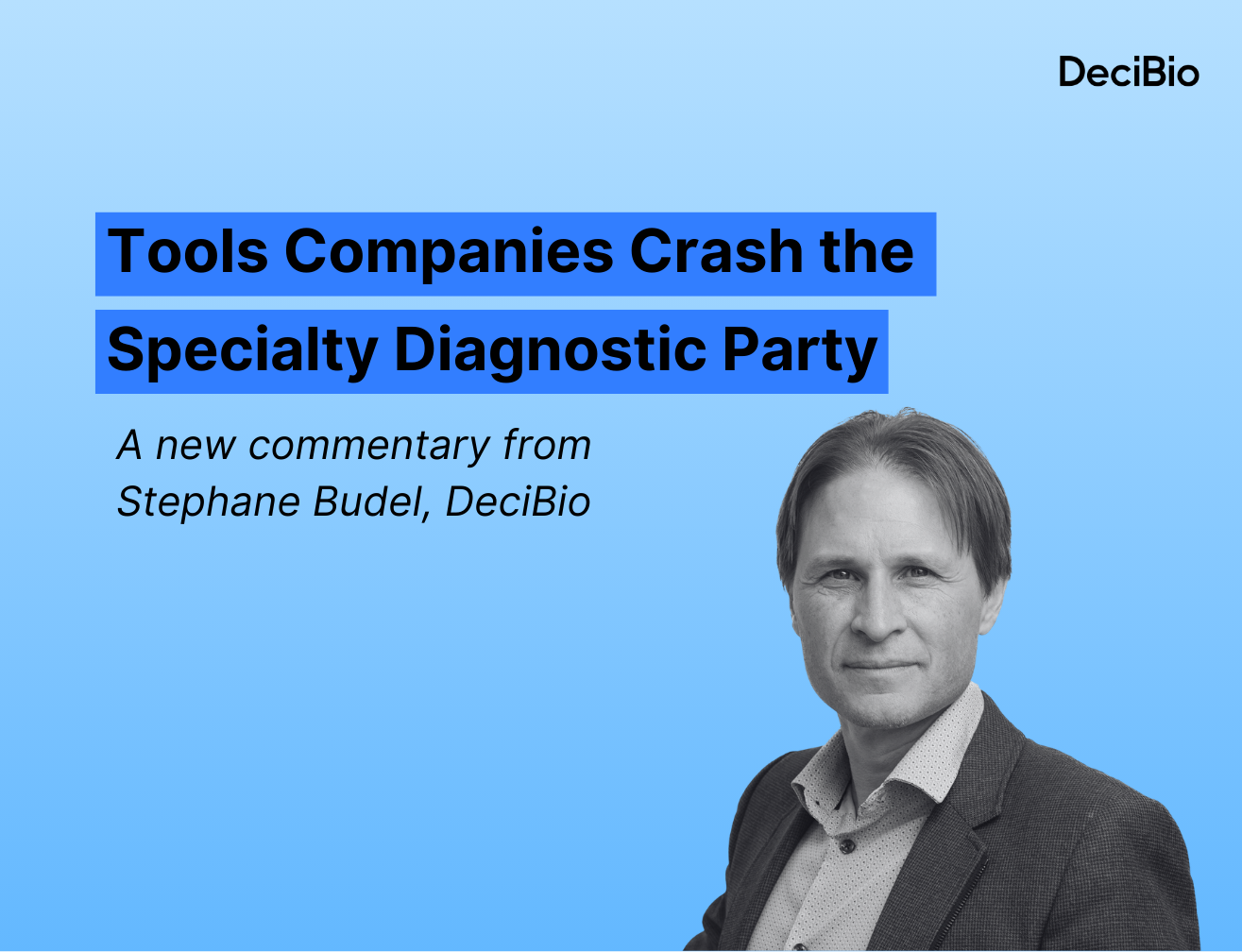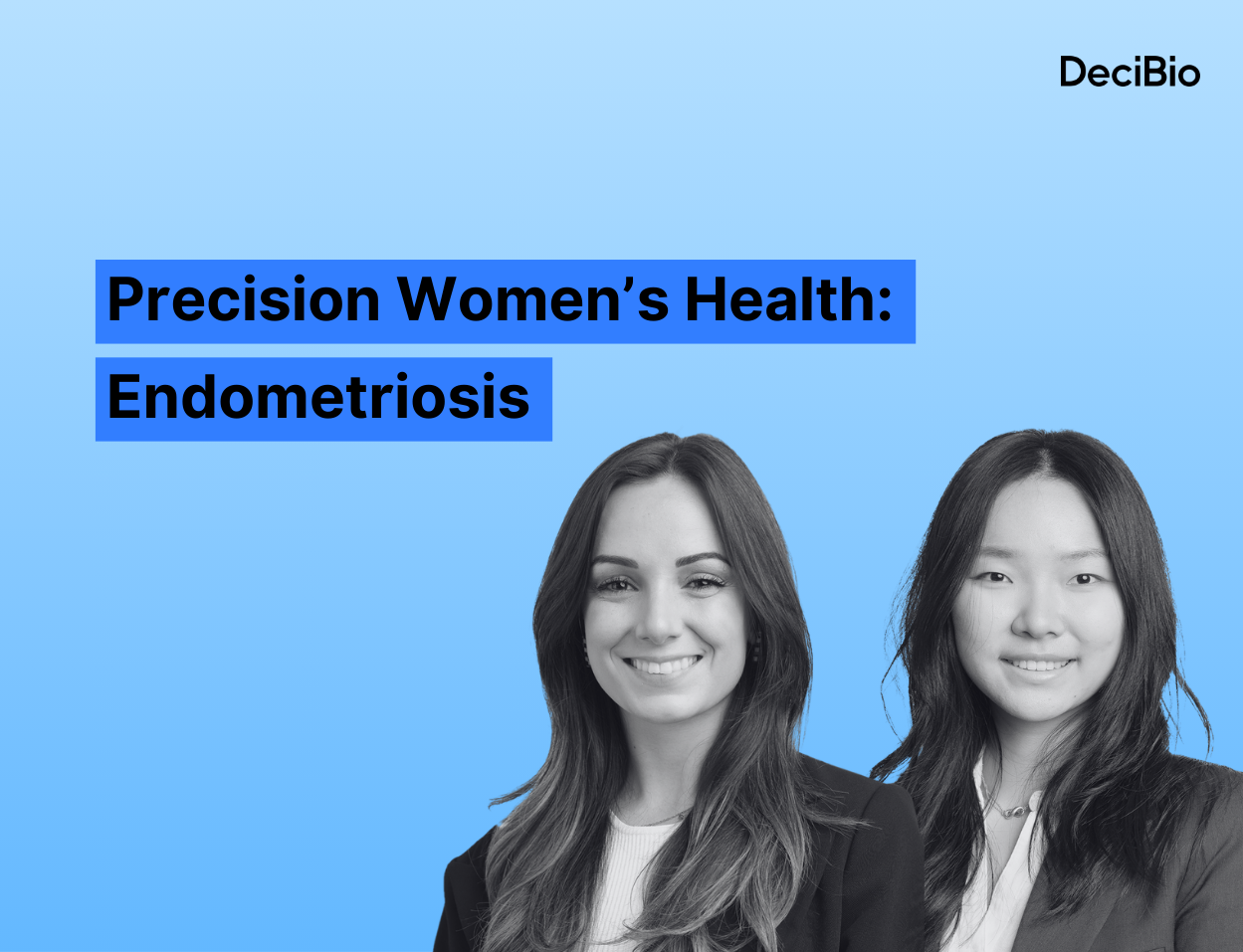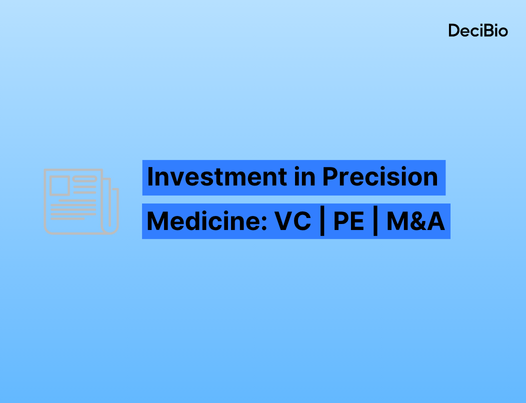On this episode of Precision Medicine Chats, we are speaking with Jessica Owens. Jessica started her career as a scientist at the CDC working in special pathogens, and since then has 20 years of experience as an investor and entrepreneur in therapeutics and diagnostics, most recently as a co-founder of Grail. Now she is a co-founder and partner at Initiate Studio, a venture studio at the intersection of healthcare, life sciences, and technology.
We talk about their unique co-founding “slash” investing approach and what, in her experience, makes for a successful life science venture. We also touch on how digital biomarkers start to play into the precision medicine landscape, as well as a few lessons learned from the COVID-19 pandemic.
There are a lot of studios, incubators, accelerators, etc. out there. Can you tell us a bit about how Initiate is different and it is you decided to start it now?
Our studio is different in a couple ways I would say. First, we’re not a volume shop, so we don’t have a class, we don’t have 15 companies we’re working with at the same time. We really wanted to be selective about the projects that light us up and interest us, and the people who drive those projects. One differentiation is that we really focus; when you work with us, you work with one of us as your lead partner and typically have a second who is running back-up. Our model is to just roll-up our sleeves and partner in the way a co-founder would, to map out, you know, “What are the market segments? Who should we approach first? Let’s go through our rolodex and figure out who we can call for some market research.” Our goal is that we focus our time on 1 – 2 projects at a time, so that gives us a lot of ability to add value in a different way than an accelerator or historical incubators that have classes.
The other thing we bring that’s unique – and I think you’re starting to see more of these popping up – is that we also bring capital. And it’s not just “here’s the way you build a pitch deck”; it’s “what do we need to get done and what is the budget required?” If we need to do a huge market study, or have IP that needs to be licensed, we’re able to. It’s really all about what the company needs to get itself packed up and prepared to go out and capitalize on an opportunity after they secure that first round of financing. I’d say that’s another piece, that we’re really flexible.
Let’s talk a bit about the technologies and the health care spaces or health care developments that you think might have the most impact. Is any space in particular that you are looking to invest in, or any space that you think is extremely exciting?
I would say we see the world in 3 buckets. One is the technologies, tools, and services that advance pharmaceutical and biotech development. Those aren’t necessarily compounds or assets that are being advanced themselves, but more supporting platforms and technologies. So we have a whole practice area around pharma services, and we have a company in the studio that we’re working with now that is building a rare disease CRO. It comes with the appreciation that “rare diseases” make up 25% of disease out there, they are just individually rare. But when you put them all together, the needs of pharma companies and biotech companies developing drugs for smaller patient populations are really more about delivering on the promise of personalization in precision medicine.
As you gain the ability to home in on a specific mechanism of action, you also have a need to be able to find patients and conduct studies. There’s actually a great deal that all of the rare diseases have in common when it comes to how you conduct a trial, and so this rare disease CRO we’re working with is deploying some of the best-in-class collection of real-world data and being able to have expertise in recruiting patients from across a very broad landscape when you’re looking for a needle in a haystack. That’s something we’re really excited about on the pharma services side, but also in that bucket we’d put something like a target-discovery platform, or an AI/ML-driven antibody discovery platform.
The second bucket I would describe is tools and diagnostics. These are the GRAILs of the world. Randy Scott has been a founder 3 times and taken a company public, I believe, Insight, Genomic Health, and Invitae.
Not a bad track record.
Not a bad track record, and he’s an amazing person. That’s an area we’re really excited about. There’s so much going on in oncology, but what has been very interesting about the pandemic is that it has heightened all of our awareness of the importance of diagnostics in precision medicine and the clinical actionability of that information and having the right information in the right time. I think that’s something that creates a tailwind for the industry. I’m very interested in the decentralization of testing, getting the right test to the person who needs in the right moment, not having to wait 14 days to be mailed off and then brought back.
And I think the other thing that is interesting is, we’ve seen what’s happened in oncology and it’s happened for a number of reasons, but there’s a lot of really interesting happening in immune-mediated inflammatory diseases and areas that are outside of oncology where precision medicine has the power not just to help patients who maybe need different drugs, but also in the facilitation and development of new drugs by identifying these patient populations. So that’s an area we’re really excited about; slowly but surely, we’re going to reach the day where we will be delivering on this futuristic promise of being sequenced when you’re young, knowing that you have certain potential drug reactions, knowing that certain risk factors are more important for you to pay attention to. We’re stepping back into that, we’ve seen it with carrier screening and NIPT. The newborn testing paradigm today is in need of a pretty massive overhaul, but we will be marching towards that vision over the next few decades.
One thing that we’ve also seen during the pandemic is that the scientific community can sometimes have a challenge with communicating to a broader audience that doesn’t have an understanding of the scientific principles underneath it. When you start thinking about broad genomic testing, universal NIPT, things like that, how much of the thought process is also around how we start to think about this in a way that becomes accessible to a non-scientific community, to patients who don’t necessarily have an understanding or even interest in the science behind it?
You make an excellent point, I think that is shift in our industry that every company needs to take pretty seriously because I think as a whole the industry has lagged in its savviness in communicating with just people. We’ve come a long way in the industry, and yet we know that people want to be called people, not patients. Pharma stood up and noticed that 5 or 10 years ago and yet we refer to patients all the same. As it turns out, we’re all just people, and nobody really wants to be a patient. That’s just a role we play in our lives as people, sometimes we happen to also be patients. There’s such a room for improvement, and you see in companies that have been quite successful during the pandemic are the ones who have been able to do this well. 23andMe was in the lead for a decade ahead of other people, figuring out how to communicate with consumers. I’m still just a fan of people, because we don’t necessarily need to be consuming anything to be learning and growing and understanding.
The other thing that is just a hard and real thing to overcome is that, as of a few years ago the pharmaceutical industry was right next to big tobacco with respect to the trust of the public.
Or lack thereof.
Yeah, which is really kind of sad. As I was sitting here watching this pandemic unfold, I thought, wow the private sector is going to save us, innovation is going to be the remedy when this all plays out. It’s not going to go away, but we’ll to a point where we can co-exist with this virus.
It’s interesting that there has not been more effort on the part of pharmaceutical companies to humanize this. I guess we’re all in a hurry, everyone is rushing -- God praise the vaccine developers, I’m looking forward to getting my booster when it’s my time and I’ll have my children first in line to get their vaccines as soon as they are able to. It’s been humbling to have little kids in this and to know that we have to continue to keep them safe as best we can.
But I’m a big fan of people who want to do the work of figuring out how to communicate with people as people and not just patients, and I think it’s a really important part of how to move the trust in pharmaceutical companies. We still have a long way to go, the Sackler trial going on in the background is not helping. There’s so much to overcome, so I think it’s an important part every company’s strategy: what is your communication strategy, because it matters.
You mentioned you’re looking to invest in some of these spaces, is there any specific ingredient for success you’re looking for?
For me, I would start with people. After doing this for so many years, every company and every project hit speed bumps and unexpected challenges along the way. One of the most important criteria in continuing to have the resilience to keep moving is to have a founder who believes. That sense of, “I can make this work. We’ll figure this out.” I think that’s crucial to the success of company. I really like companies where the founder has been in a start-up type of environment, because you know the ups and downs are totally normal.
This would happen at GRAIL a lot. We started up and would recruit people from Genentech or Google, wonderful companies, and two weeks in you’d have a one-on-one and you’d say, “how’s it going? How are you feeling, you doing alright?” And they’re either like, “Yeah this is exciting!” Or they’re white-knuckled, like, “is this what it’s like?” Yes, totally normal! Totally normal to be in a start-up and feel like you’re moving fast, because you are.
People are the most important ingredient in a start-up, because people can make things work. People can change strategy. People can ship out a product. Great people can carry a business. So that’s number one.
Number two, I really think we are on the verge of technologies we might’ve backed 5 – 10 years ago now being in a position where we can say, this is great, but how does the infusion of data platforms, digital platforms, and data itself enable a kind of step-function in what we could do before. Those are things that I’m looking at really closely, what is the technical angle that changes it and unlocks a completely new opportunity? We’re looking for technology-informed solutions that will scale as our ability to look at data and analyze it scales.
To me that’s a crucial piece. I think when you’ve been in health care for a long time and you’ve seen a lot of data, you get that it’s not just data for data’s sake. If you look at applications of artificial intelligence models on large datasets that have great promise, they’re datasets where you know some things. It’s not just a big messy mess of data. I saw this really interesting study where they were analyzing a certain organ of the body, and their AI / ML models could figure out if this was a woman or a man. I can’t remember exactly what it was looking at, but I thought it was incredible.
But then it occurred to me, “they have ground truth.” They know whether it’s a woman or a man. I think what gets really interesting is when these models can start to be populated with such robust data that you can start to learn new things without necessarily having a hypothesis. That’s the future-future, I think today a lot of this work is still hypothesis-driven, and it has to be for a lot of reasons. But I see in the decades that come actual discovery inside datasets that can be less hypothesis-driven and more based on applying analysis in ways that illuminates things we couldn’t see before. I think that’s really cool.
I agree, there’s a number of companies that are very exciting right now with very high valuations, and you can tell the value is in the data, in the information. I think Foundation Medicine early on was very successful because of that, and they knew it. A lot of people can do sequencing, but if you can start to also link it to outcome data, it becomes highly valuable
On that point, I think that something else that will be interesting to see how digital biomarkers can start to add value. We might have discussed this example in the past, I think it was at Bing, that the search engine could detect pancreatic cancer in a person a couple months before they made their first appointment with a doctor based on search results, when they were searching, time on page, et cetera.
Do you think that this interaction between digital biomarkers and “wet lab” biomarkers is going to take place over the next decade or two?
Yeah, I do. I’m so interested in this space, and I think it’s completely feasible and doable. What strikes about it is that the development of digital biomarkers really isn’t all that different from the development of any biomarker. If it’s a pattern in the blood of a certain analyte, for instance, you’re looking for that pattern and you’re looking for classifiers that pull two groups apart.
I think what will really drive this field forward is when you have companies with this very strong data and computer science strategy behind them, but you also marry them up with clinical developers who have done this kind of development before. Because the number one I see, and you see it all the time, is that the training sets aren’t quite set up properly. There’s this thing, but to reproduce it, you do need to have a structured trial. You can imagine if it’s passively collected in our phone, I would image there’s probably hundreds of things from the ways we interact with our phone, and of course there’s a number ofc companies working in this space, but you could marry that up with an entire episode of care. Pick your disease, pick your unmet needs, and what you have is your phone with you passively collecting information about how you’re doing in between doctor visits. I would be surprised if you couldn’t predict all kinds from that, but they just have to be studies in a prospective way. It’s back to Science 101, which is you have a hypothesis, you have to set up an experiment, and then you have to test it. I’m very excited about this space. I hope to see more companies going after some of these episodes of care, because what happens at your home is meaningful for a patient and expensive.






.png)



